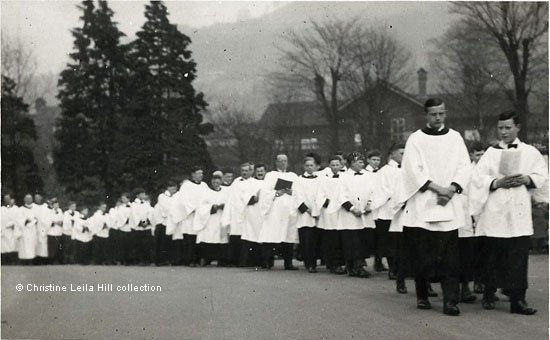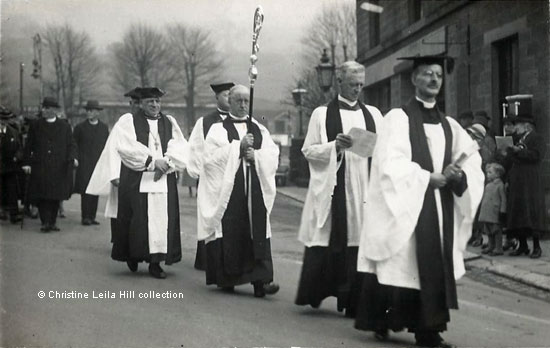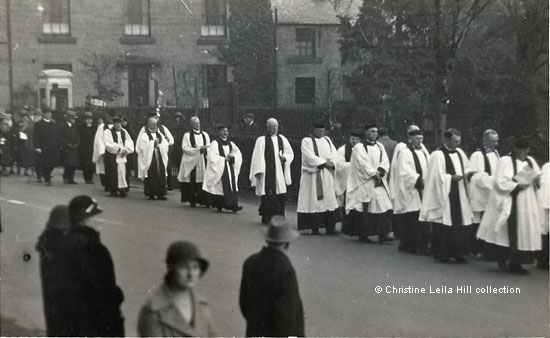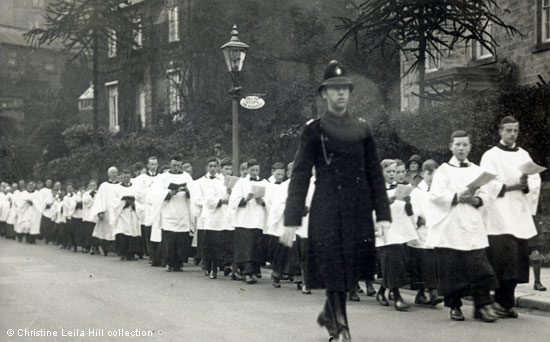A series of eleven photographs marking a religious parade through
the village streets. Amongst the participants were the choir
of Matlock Bath's Holy Trinity Church. They were taking part
in a Procession of Witness and Call to Repentance held by the
Archbishop of York, Dr. Temple, on Ash Wednesday, 1935 (6th March),
so on the first day of Lent in that year. The Procession consisted
of massed choirs and clergy from the churches in the district
as well as representatives from other organisations.
They were captured on camera by Mr. Harry Gill but are
all from the collection of the late Cyril Edmonds, the owner of the
Cumberland Cavern, as his two sons were part of the parade.
These pictures are photographs from his family album.
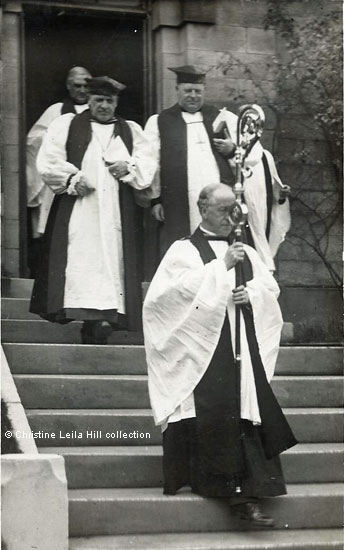
|
Members of the clergy leaving Matlock Bath's Vicarage,
which was then on Brunswood Road.
The photograph shows
The Bishop of Derby, the Archbishop of York (right)
with Canon G. A. Hazelhurst of Cromford in front[1]. |
They were to march along North and South Parades to Matlock
Bath's Holy Trinity Church where they would attend a service
conducted by the vicar of Matlock Bath, the Rev. Arthur Phibbs.
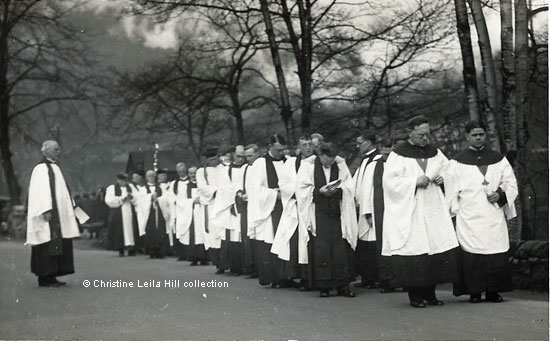 |
The clergymen assembling on the road below
the Parochial Hall,
with the Archbishop and Bishop at the back. |
In addition to the Archbishop of York and the vicar of Matlock
Bath, the other clergymen present included the Bishop of Derby,
the Rt. Rev. Courtney Pearce, the Archdeacon of Derby, the Ven.
E. Spencer Noakes, the Revs. A. Urling Smith the Rector of St.
Giles', R. Griffiths the Rector of St. Helen's, Darley Dale and
C. F. W. Whiteside, the Curate at St. Giles' and Curate-in-Charge
of St. John's. The Nonconformist ministers who took part were
the Revs. T. Greener Gardner of Matlock Bank Methodist Church,
J. Johnstone Jones from Matlock Congregational Church, and W.
Smart from the Lady Glenorchy Congregational Chapel near Masson
Mill[2].
 |
Having assembled at the Parochial Hall, this photograph
shows the all male group pausing outside the Midland Hotel before
the parade got underway. They were scheduled to leave Station
Approach at 3.30p.m.[3] Only
three Matlock Bath choristers are on this first picture and Cyril
Rowland Edmonds is the third boy from the right. The clergy are
at the back of the line.
The Bishop and Archbishop pass the entrance to
Station Approach,
followed by representatives of various local organisations.
Local people were watching as the Procession
began to walk down North Parade.
The Midland Hotel and the entrance to the Promenade can be seen
behind the marchers.
 |
The seventh image (above) shows Matlock Bath's choir on their way
to Church and singing as they marched; they were passing the
Fish Pond where there are some large cars in the car park. Several
more choristers have been identified in this picture, although
they are not easy to see here. Frank Evans, the brothers Frank
and Jack Clay and Theodore Aspey all took part. Behind them are
men from other churches. It is interesting to see how long the
parade actually was, especially as we don't know whether Matlock
Bath choir was at the front. Right at the back, marching behind
the men and boys in their surplices and cassocks, are a small
group of people who are also part of the parade.
They are all holding up two North Western buses; the buses would
not have been able to drive past them as it would not have been
deemed to be respectful.
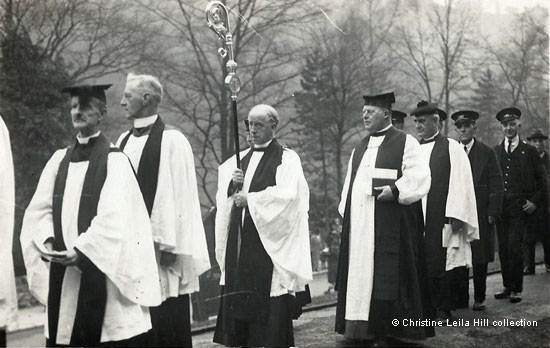
|
Senior clergy preparing to enter Holy Trinity church for the
service.
The Archbishop was holding his sermon.
Note the two railwaymen behind them (there were another two,
but their faces are hidden). |
The sermon was given by the Archbishop. He also dedicated a number
of gifts received by the Parish Church which had been made anonymously
in the previous months, including new kneelers, redecorating the
chancel, carpets on the chancel steps and in the choir stalls,
two sets of electric lighting and putting the churchyard in order.
The Duchess of Devonshire was amongst the large congregation[2].
Mr. Benjamin F. O'Dowda and Mr. A. W. Whittaker, the churchwardens,
and Dr. Clifford William Sparks, the Secretary of the Matlock Bath
Parochial Church Council, also attended the service. Mr. G. W. T.
Smith, the headmaster of the Matlock Town schools, played the organ[1].
The collection was in aid of the Bishop of Derby's Appeal Fund and
Holy Trinity Church expenses.
 |
The ninth picture shows the choir returning from Holy Trinity
Church after the service - and still singing. They had reached
the Fountain Baths and Derwent House on North Parade, where someone
is peering out of the window. Cyril Rowland Edmonds, who was
to die in the Second World War, is the chorister immediately
below the edge of the sign; he is looking towards the camera.
Warren Boden, who ran Hodgkinson's Hotel at that time, is on
the far right.
The column of choristers with their police escort had now rounded
the corner and were passing Fernie Bank and the houses of
Fountain Villas. You can see the monkey puzzle trees in the gardens.
Raymond Edmonds is on the far right, at the head of the parade.
The sign on the lamp post reads "Bus Stops on Request".
To the left of the lamp
post, standing watching the parade, was almost certainly one of
the Miss Hands, who lived at 1 Fountain Villas.
 |
| Clergymen parading past Fountain Villas after the service. |
At the end of the proceedings they were treated to the tea that
had been laid on at the Parochial Hall. The Archbishop had his
tea at the Vicarage, but he afterwards paid a short visit to the
public tea which had been provided with the help of Mrs. O'Dowda,
Mrs. Randle, Mrs. Oliver, Mrs. Mosley, Mrs. Wyvill, Mrs. Slawson,
Mrs Doxey, Mrs. Clay, Miss Riley, Misses Hollingsworth, Webster,
Chadwick, Ludlam, Ledbetter and Holmes[2].
He then returned to York by train from Chesterfield station[1].
|


